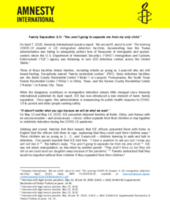This page contains documents and other resources related to children's care in the Americas. Browse resources by region, country, or category.
Displaying 341 - 350 of 1438
This study uses secondary data analysis of the Canadian Incidence Study of Reported Child Abuse and Neglect 2008 to explore what case and worker factors predict the provision of ongoing child welfare services.
This study focused on kinship care as the top of the hierarchy of out-of-home care placements and utilized data obtained from a U.S. mid-Atlantic State Automated Child Welfare Information System. The study followed children who placed in out-of-home care over a three-year period.
The current study aimed to describe the relative contributions of measures of professional quality of life (ProQOL) to intent on leaving the workforce among child welfare professionals.
This study systematically summarizes the effect of parenting interventions on kinship foster caregivers and their cared for children, and examines the intervention strategies and research methods used in order to provide a context in which to better understand effects of interventions.
This document from Amnesty International reports on the family separations happening at U.S. immigration detention facilities in light of the COVID-19 crisis.
This exploratory secondary data analysis compares demographics, mental health/well-being, and protective mothering strategies of mothers who have experienced intimate partner violence (IPV) whose children were taken into care compared to those whose children were not to identify key characteristics associated with children being removed by child protective service (CPS) in Western Canada.
The purpose of this study was to evaluate the consequences of criminal justice–related prenatal substance use policies for family reunification and to examine differences in parental reunification by racial/ethnic group.
The purpose of this study was to examine the impact of a peer-delivered detection and active outreach program upon depression and engagement in mental health services among caregivers involved in the child welfare system.
The objective of this study was to assess factors impacting child-welfare involvement and child abuse and neglect outcomes among prenatally substance-exposed infants.
This paper provides a summary of laws, policies, and programs pertaining to stepfamilies in a selection of Western countries, with a special focus on the United States.


